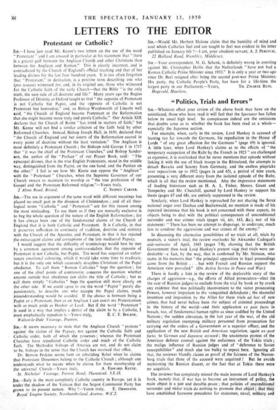2 Alma Road, Bristol. C. SYDNEY CARTER. SIR,—The use in
argument of the same word with different meanings has played no small part in the disunion of Christendom ; and of all theo- logical terms "Catholic" and " Protestant " are for this reason among the most misleading. To use them as if they are mutually exclusive is to beg the whole question of the nature of the English Reformation ; for It has always been one of the fundamental claims of the Church of England that it is both Catholic and Protestant. It is Catholic, in that It preserves untroken its continuity of tradition, doctrine and ministry with the Church of the Apostles, and Protestant, in that it has rejected Ihe extravagant claims and corruptions of the late mediaeval Papacy.
I would suggest that the difficulty of terminology would best be met by a common agreement among controversialists that the opposite of Protestant is not Catholic, but Papist. The word has acquired an unfor- tunate emotional colouring, which it would take some time to eradicate, but it is the only one which accurately describes Christians of the Papal obedience. To call them "Roman Catholics" begs the question ; for one of the chief points of controversy concerns the question whether anyone outside that obedience can claim the title of Catholic ; but to call them simply " Catholics " begs the question still more clearly on the other side. If we could agree to use the word " Papist " purely dis- passionately, to describe one who accepts the Papal claims, much misunderstanding would be avoided. If the choice is between being a Papist or a Protestant, then as an Anglican I can assert my Protestantism . . with as much pride as Hooker or Laud. But if the word "Protestant" Is used in a way that implies a denial of the claim to be a Catholic, I
must emphatically repudiate it.—Yours truly, E. C. E. BOURNE. Walton-le-Dale Vicarage, Preston.






























 Previous page
Previous page